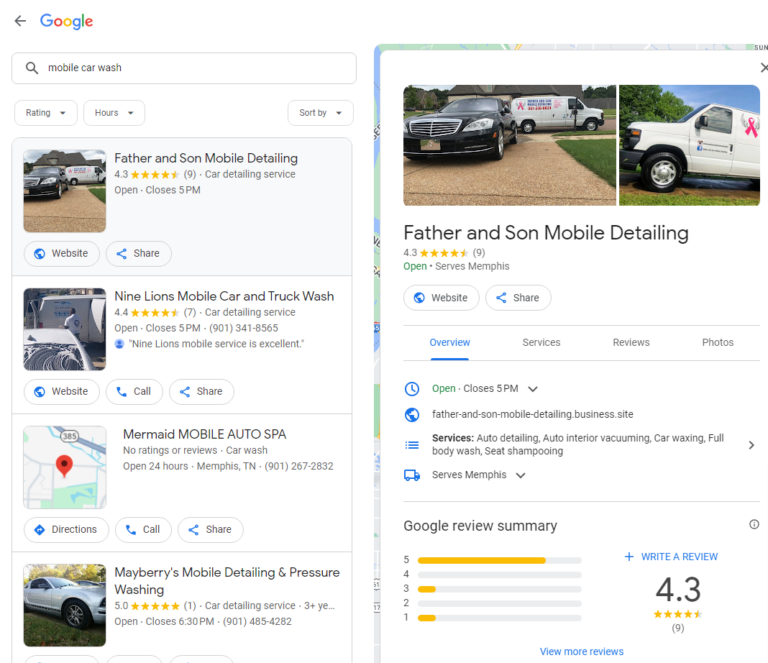
Local SEO Strategies for Online Businesses: Enhancing Visibility and Customer Reach

Discover effective strategies to enhance your online business's local SEO presence. Learn how to reach more local customers and increase organic visibility using Google with this comprehensive guide.
Maximizing your organic visibility for location-based searches is extremely valuable. A successful local SEO strategy can help you connect with more local customers, resulting in a significant increase in both in-store and online traffic and sales.
But if you don’t run a brick-and-mortar business, can you still take advantage of local SEO?
Fortunately, the answer is yes!
Today, we’ll explain how to overcome the challenges of building a solid local search presence without a physical storefront.
Difficulties Of Local SEO For Non-Physical Businesses
Search engines consider the actual location of businesses when deciding which listings are most relevant for local searches.
For example, if a business is based in Nashville, Google might prioritize it for searches conducted in and around the city.
Businesses without a physical address face a clear challenge. How can they compete in local search rankings if search engines prioritize physical proximity to the user? This is especially problematic for businesses that provide services in the local area but do not have a physical storefront.
The good news is, even if you don't have a physical address, you can still boost your local SEO presence. For instance, if you operate a service-area business where you meet customers face-to-face but not at a specific business location, Google lets you set up a Business Profile. This helps you manage your local visibility on Search and Maps.
Google states that businesses without a physical address can still have a profile as long as they have in-person contact with customers. Additionally, service-area businesses that visit or deliver to customers directly, but do not serve customers at their business address, such as plumbers or cleaning services, are also eligible to have a profile.
And besides creating a Google Business Profile, there are a few other techniques non-physical businesses can use to boost their local SEO presence.
Let’s look at each solution in turn.
5 Ways To Master Local SEO Without A Business Address
1. Correctly Configure Your Google Business Profile
One way to start is by creating a Google Business Profile (GBP) for your service-area business. This tool allows you to easily set up and manage a free listing for your business on Google. Your GBP serves as a convenient summary for users, offering key details such as operating hours, contact information, and feedback from customers.
Here’s the GBP for a mobile car wash near me in Memphis, TN:
google search: mobile car wash
When setting up a Google Business Profile for a service-area business, there are some differences compared to brick-and-mortar establishments.
The key variance is that instead of using your address, you need to define your service area by city, zip code, or another geographical area. You are allowed to choose up to 20 service areas, but they must all be within a 2-hour driving radius from your business location.
2. Create Localized Content Targeting Location-Based Keywords
When using Business Profile Manager, remember to keep the business location field blank in the Info tab. Simply setting your service area is sufficient for Google and search users to understand where your business operates.
Creating location-specific content is a great way to improve your site's visibility in local searches, even if you don't have a physical storefront. This strategy includes developing content like service pages, blog posts, success stories, and other materials that cater to the specific communities you are targeting.
By including geo-specific keywords in your content, such as the city or neighborhood you are targeting, you can boost your visibility in local search results.
For instance, if you provide pool maintenance services in Phoenix, you could write articles like "Common Pool Maintenance Issues During Phoenix's Hot Summers" to attract local customers.
Developing location-specific landing pages is crucial for targeting Phoenix pool owners and addressing their unique maintenance needs. By integrating local keywords and addressing specific issues that are common in the area, these pages can showcase your company's expertise and understanding of the local market.
Another way to improve your local search ranking is by creating dedicated landing pages for each of your target locations. These pages can feature details about the services you provide in that area, introduce your local team, showcase testimonials from happy customers, and highlight any special offers or promotions exclusive to that region. Remember to include local keywords to help search engines understand the relevance of your pages to local searches.
When creating localized landing pages, it is important to avoid simply copying the same basic page and only changing the target area name. It is crucial that each page is unique and offers valuable and relevant information specific to the area it is targeting. Replicating content with minimal changes can have a negative impact on your SEO strategy.
4. Encourage Reviews And Testimonials From Local Customers
Accumulating reviews and testimonials from local customers is yet another way to boost your local SEO as a non-physical business.
Encourage your local customers to leave reviews for your business on platforms like Google Business Profile, Yelp, and Facebook. These reviews provide social proof to potential customers and demonstrate to search engines that your business is relevant and reputable within a specific area.
Keep in mind that it is against the policies of review platforms to request positive reviews in exchange for discounts, free services, or other financial incentives.
Instead, you should encourage honest customer reviews through thank you pages on your websites, follow-up emails, social media posts, and other appropriate channels.
Engaging with customer feedback is crucial for maintaining a positive reputation and showing a commitment to improving services. Responding to reviews is just as important as requesting them.
Google also promotes businesses engaging with reviews as a way to enhance their local rankings.
Managing Your Local Citations
Ensuring that your business information is consistent and accurate across online directories and platforms is essential for building trust with your customers. This includes your business name, address, phone number, and website URL. By managing your local citations effectively, you can improve your online visibility and make it easier for potential customers to find you.
Updating online mentions of your business’s name, service area, and phone number can boost your local SEO. Citations from trusted sites like Yelp, Foursquare, and local directories show Google that your company is relevant in a particular location.
When managing your local citations, it's important to ensure that your business information is both accurate and consistent across all platforms. This will help search engines trust your business and display it in local search results.
Quality matters more than quantity when it comes to local citations. Focus on getting listed on directories that are relevant to your industry and location for the best results.
What About Online-Only Businesses?
So far, we’ve focused our attention on non-physical businesses that still make in-person contact with customers within a specific area.
But what about fully virtual businesses? Can they still enjoy the rewards of local SEO?
Again, the answer is yes – but it’s more difficult to achieve.
Virtual businesses often struggle with local SEO due to the limitation of not being able to create listings on Google Business Profile and other online directories that need a specific service area.
However, online-only businesses can enhance their local search visibility by using alternative strategies such as creating localized content, focusing on location-specific keywords, building local landing pages, and collecting reviews and testimonials from local clients.
No Address? No Problem
Running a business without a physical address doesn’t mean you can’t reap the benefits of local SEO.
There are various methods to inform search engines about your business's geographic location, such as setting up a Google My Business profile and sharing content tailored to specific locations.
It's important to keep in mind that optimizing your local SEO is a continuous task, regardless of whether you have a physical address for your business.
More resources:
How Can Small Local Service Businesses Use AI To Improve Their Digital Marketing?
7 Ways To Improve Local SEO & Attract New Business
Local SEO: The Definitive Guide to Improve Your Local Search Rankings
Featured Image: WBMUL/Shutterstock
Editor's P/S:
The article provides valuable insights into how businesses without a physical address can enhance their local SEO presence. It emphasizes the importance of creating a Google Business Profile, even for service-area businesses, to establish a digital storefront. Additionally, the article highlights the significance of creating localized content, targeting location-based keywords, and encouraging customer reviews to improve visibility in local searches.
Despite the challenges faced by online-only businesses, the article offers alternative strategies to boost local search performance. These include focusing on location-specific content, building local landing pages, and leveraging reviews and testimonials from local clients. The article concludes by emphasizing the ongoing nature of local SEO optimization, regardless of whether a business has a physical address or not. By consistently implementing these strategies, businesses can effectively reach their local target audience and drive traffic and sales.







